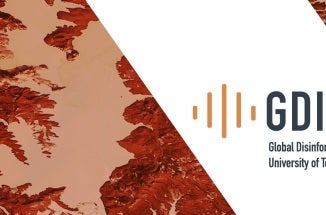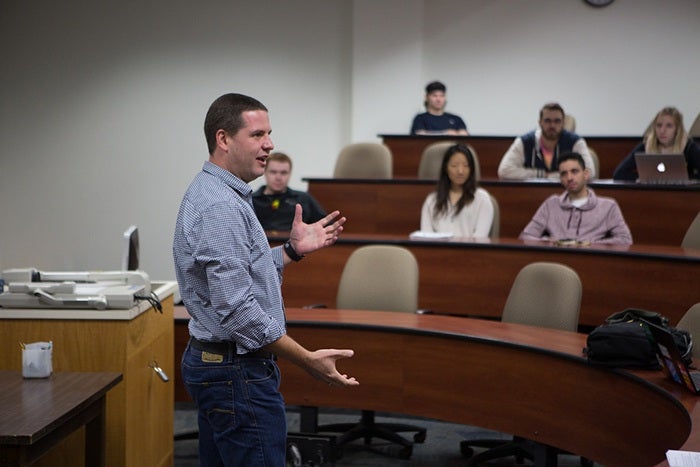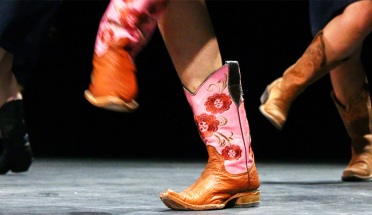
When a Word Becomes a Bullet: International Scholar Combats Disinformation
- Aug 19, 2024
- Sophia Baca
Kiril Avramov, Ph.D., holds multiple titles at The University of Texas at Austin, including assistant professor in the Department of Slavic and Eurasian Studies, fellow at the Intelligence Studies Project in the LBJ School of Public Affairs and co-director and founder of the Global Disinformation Lab (GDIL). In the latter role, he undertakes research, mentors students and leads team efforts to identify and dispel disinformation and its harmful effects on global discourse.

In 2020, Avramov established the GDIL with Mary Neuburger, director of the Center for Russian, Eastern European and Eurasian Studies (CREEES), and Ryan Williams, a Ph.D. candidate at the LBJ School who now serves as the lab’s deputy director. A 2019 initiative chaired by Neuburger hired four faculty positions, including Avramov, from three colleges across campus. The GDIL was then formed as a hub for connecting UT faculty interested in global disinformation and providing student research and training opportunities.
“Kiril and I worked together with the GDIL team to get the lab up and running, as the study of Russian disinformation was pivotal to the work of the lab, which is housed within CREEES,” said Neuburger. “Disinformation is a global issue, and we must approach it with that in mind, with our eyes wide open to the major global players.”
The lab studies the implications of the global circulation of disinformation and devises policy recommendations to combat the phenomenon. It brings together what might otherwise be disparate efforts, uniting research in the liberal arts and STEM disciplines in what is one of UT’s most interdisciplinary labs.
“We have fantastic people that study languages and deep dive in various cultures, and we have wonderful faculty that know about context, history, and so on,” said Avramov. “And on the other side, we have top-notch data scientists and engineers. In my mind, it's a natural marriage. They need to start talking to each other.”
Defining and Disproving Disinformation
Avramov defines the term disinformation as “false information that is designed by intent to mislead and cause harm.” Disinformation has always been a weapon of political propaganda, ranging from improbable conspiracy theories to widely spread fake news that can potentially alter public opinion. The greater sophistication of technology and development of artificial intelligence has made disinformation more easily manipulated and spread.
For the past five years, Avramov has been committed to combating disinformation in non-Western political warfare, describing his primary interest in analyzing instances “when a word becomes a bullet.”
Avramov explained this concept, saying, “We start with the malignant events that are catching immediately and having these profound effects on societies, usually trying to tear at their unity, create divisions, and elevate tensions. These are what we call ‘weaponized narratives’ and conspiracy theories.”
Building a Career Abroad
Avramov, originally from Bulgaria, received his undergraduate degree from a small liberal arts college in Minnesota. He then returned to his home country to obtain his master’s degree and doctorate from the New Bulgarian University and the University of Sofia, respectively.
Before coming to UT, Avramov worked as a political consultant in Central and Eastern Europe. He credits his experience in this line of work for piquing his interest in disinformation in non-Western countries.
Avramov said the most formative aspects of his background were the many countries where he’s lived and worked; these include Bulgaria, Hungary, Scotland, India and the United States. Consequently, he is an avid proponent of studying abroad and encourages his students to take advantage of any international opportunity they can get to diversify their academic perspectives.
“My advice is: if it makes sense, take it,” said Avramov. "Jump, because the world is interconnected nowadays. The broader your outlook is, the more varied your experience, the more it adds to your maturity and professionalism.”
De-Engineering Deception
So, how do Avramov and his colleagues and students at the GDIL combat instances of disinformation?
They approach disinformation events the way any other engineering lab at UT would, said Avramov. He explained that they first take apart a phenomenon to “see what it’s made of and what makes it actually harmful [and then] seek policy recommendations as to how to improve our understanding and boost our defenses.”
To achieve this, Avramov works with teams that exemplify diverse skill sets, including engineers, data scientists, mathematicians and rhetoric experts.
“It’s not easy,” he clarified, “because people have very different views.” However, because disinformation has both technological and political implications, this variety of viewpoints and skills is imperative. He also stresses that the GDIL utilizes all the resources a large research institution like UT has to offer.
“UT has a natural advantage over some of our competitors. I mean, size does matter in the sense that we have such a diverse student body. My dream has always been to connect parts of campus that usually do not talk to each other.”
Project Bearclaws
One of Avramov’s projects at the GDIL, Project Bearclaws, analyzed verified cases of elimination and political assassinations of Russian opposition leaders and journalists in Putin’s regime. Driven by Avramov’s experience and focus, the project explores the kinetic side of eliminating political dissent but also specifically scrutinizes the accompanying processes of targeted character assassination, the wrongful slander of a public figure.
“I'm interested in how language and disinformation actually surround those operations in general — not only in Russian but also broader non-Western operations,” said Avramov. “How do they shape the public discourse to make the use of this phenomenon acceptable, and even utilized by specifically nondemocratic regimes as a foreign policy tool?”
Avramov and his team of graduate and undergraduate students created an active database in which these cases can be cross-referenced to discern which tools were employed and how. This allowed the team to learn why and how certain people are victimized, enabling them to improve regimes’ security protocols and understand the activity that tries to evade public scrutiny and media monitoring.
Avramov and his team have published some of their findings and plan to continue their research for Project Bearclaws into 2025.
Prioritizing Student Involvement
Avramov stresses the importance of providing his students opportunities for leadership and professional recognition from within the GDIL.
“In the beginning, we were like five or seven of us, and now we're talking about 100-plus students on a number of projects that are supervised by faculty,” said Avramov. “This has started with our expectation that it's a platform where students can come to interact, and this is probably the most important thing for me.”
Avramov also, as a rule, routinely publishes with his students. Not only does this help his students develop critical research skills, but it also provides a way for them to gain recognition for their work and develop further professionally.
Avramov is exceptionally proud of all the students working at the GDIL, calling them “the best and brightest.” He notes that almost all the lab’s graduates are currently employed in government or defense fields and academia, making it clear that the skills and experience they gained at the GDIL are highly valuable.

The Global Mind
Avramov hopes to continue leading the GDIL’s important research as well as its diverse teams of colleagues and students. He recognizes the ever-more pressing need for scholars to maintain vigilance and proactivity in working to detect, expose and refute instances of disinformation, in the interest of both civil discourse and global unity.
But as advancements in technology and AI accelerate, human attitudes often turn to distrust and cynicism. Avramov also counsels caution against the tendency to tune out dissent and retreat into communities where one’s ideas are never challenged but only reinforced.
“The real fear I have actually is of closing not only the proverbial American mind, but the closing of a global mind,” Avramov said, speaking to the importance of the GDIL’s work beyond the U.S.
In an increasingly interconnected world, Avramov stresses the importance of regarding, understanding and respecting international perspectives and being able to think outside of the viewpoint of one’s own country and culture. This deep conviction is why he does the work he does.
“Long gone are the times where you can just be absolutely isolated on your own island,” he said.
To learn more about Avramov’s work, visit his UT faculty page and the Global Disinformation Lab website.



